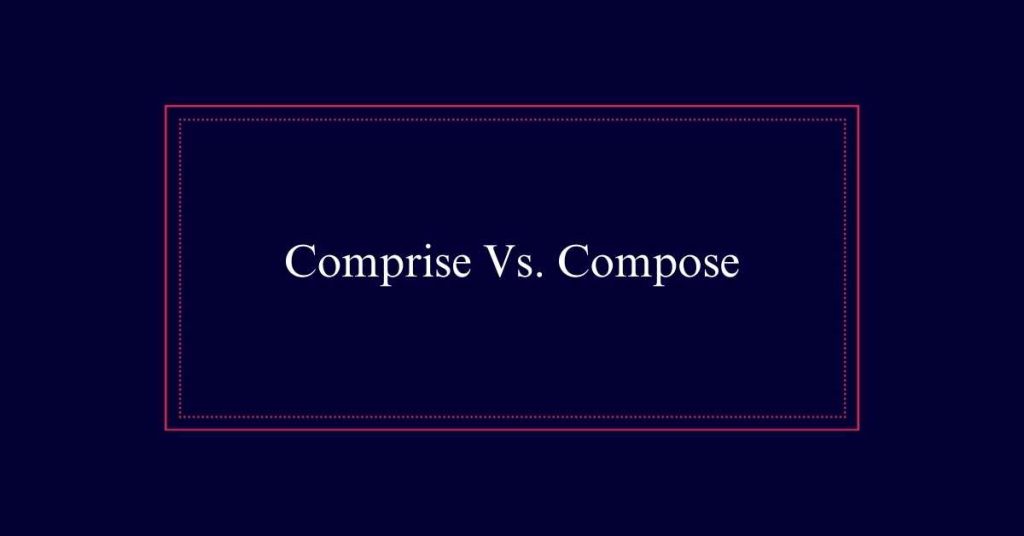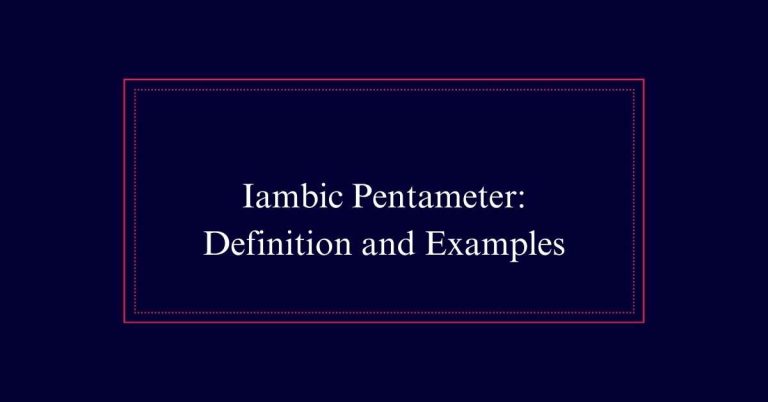Comprise Vs. Compose
‘Comprise’ means to include or consist of parts, indicating that the whole is made up of various components. For example, ‘The committee comprises five members.’ On the other hand, ‘compose’ means to form something by putting together various elements. For instance, ‘Five members compose the committee.’
Meaning of Comprise
The verb ‘comprise’ means to include or consist of specific parts. It indicates that a whole entity is made up of various components.
For instance, saying ‘The committee comprises five members’ means that the five members form the entire committee. Synonyms for ‘comprise’ include include, contain, consist of, encompass, and be made up of.
It is often misused, with some people incorrectly saying ‘comprised of.’ Though ‘comprised of’ has gained some acceptance, using ‘composed of’ is more accurate.
Meaning of Compose
Compose signifies the act of forming something by putting together various parts or elements. When we use the term ‘compose,’ we describe how individual components come together to create a whole. For instance, a musical piece is composed of notes and rhythms. Similarly, a committee may be composed of several members with different expertise.
In writing, ‘compose’ helps clarify how parts unite to form a complete entity. For example, ‘The bouquet was composed of roses, daisies, and lilies.’ This usage emphasizes the assembly of diverse elements into a cohesive unit.
Common Misuses
Many people often misuse the terms ‘comprise’ and ‘compose,’ leading to confusion in both written and spoken communication. A common mistake is using ‘comprise’ when ‘compose’ is correct. For example, saying ‘The committee is comprised of ten members’ should be ‘The committee is composed of ten members.’
Another frequent misuse is employing ‘comprised of,’ which many grammarians still reject. The correct usage is ‘The committee comprises ten members.’
Additionally, some incorrectly use ‘compose’ to describe a whole containing parts, such as ‘The album is composed of ten songs.’ Instead, it should be ‘The album comprises ten songs.’

Precision in Language
In writing, precision in language guarantees clarity and effective communication. Using words accurately helps convey the intended message without confusion.
The distinction between ‘comprise’ and ‘compose’ is an excellent example. ‘Comprise’ means to include or contain, as in ‘The committee comprises five members.’ On the other hand, ‘compose’ means to form by putting parts together, as in ‘The team is composed of experts.’ Mixing these terms can lead to misunderstandings. Using ‘composed of’ instead of ‘comprised of’ is more precise and widely accepted.
Usage Shift in Comprise
Understanding the evolving usage of the verb ‘comprise’ is crucial in moving away from the significance of precision in language. Historically, ‘comprise’ meant to consist of or include, directly describing the relationship between a whole and its parts.
However, its usage has shifted over time. Many people now use ‘comprise’ interchangeably with ‘compose,’ despite traditional grammar rules. This shift reflects changes in language patterns and common usage. As a result, phrases like ‘comprised of’ have become more widespread, even though they were once considered incorrect.
Acceptability of Comprised Of
The acceptability of ‘comprised of’ remains a contentious issue among grammarians and language enthusiasts. Traditionally, ‘comprise’ means to include or contain, thereby making ‘comprised of’ redundant.
Critics argue that ‘comprised of’ is incorrect and should be replaced with ‘composed of’ or simply ‘comprises.’ However, language evolves, and many now accept ‘comprised of’ in casual usage.
Despite growing acceptance, purists and formal writing guides often advise against using ‘comprised of’ to maintain precision and clarity. To avoid controversy, it is advisable to use ‘composed of’ when describing parts forming a whole.
Synonyms for Comprise
While the debate over ‘comprised of’ continues, it is beneficial to know synonyms for ‘comprise’ to guarantee precise communication. Recognizing alternative words can help avoid ambiguity and secure clarity in writing. Here are several synonyms for ‘comprise’:
| Synonym | Meaning |
|---|---|
| Include | To contain as a part of the whole |
| Contain | To have within |
| Consist of | To be made up of |
| Encompass | To cover or include |
Examples in Sentences
To better understand the usage of ‘comprise’ and ‘compose,’ consider these examples in sentences:
Comprise:
‘The committee comprises five members.’
This sentence shows that the whole (committee) contains parts (five members).
Composed of:
‘The team is composed of experienced engineers and designers.’
Here, the parts (engineers and designers) form the whole (team).
Comprise:
‘The book comprises ten chapters.’
This indicates that the whole (book) includes parts (ten chapters).
Choosing the Right Word
Choosing the right word between ‘comprise’ and ‘compose’ can greatly improve the clarity of your writing. To use ‘comprise’ correctly, remember that it means ‘to include’ or ‘to contain.’ For example, ‘The committee comprises five members.’ Here, the committee includes five members.
On the other hand, ‘compose’ means ‘to make up’ or ‘to form.’ For instance, ‘Five members compose the committee.’ This indicates that five members form the committee.
Avoid using ‘comprised of’; instead, use ‘composed of’ to maintain precision. By carefully selecting between ‘comprise’ and ‘compose,’ you ensure your writing is clear and accurate, adhering to standard language conventions.






